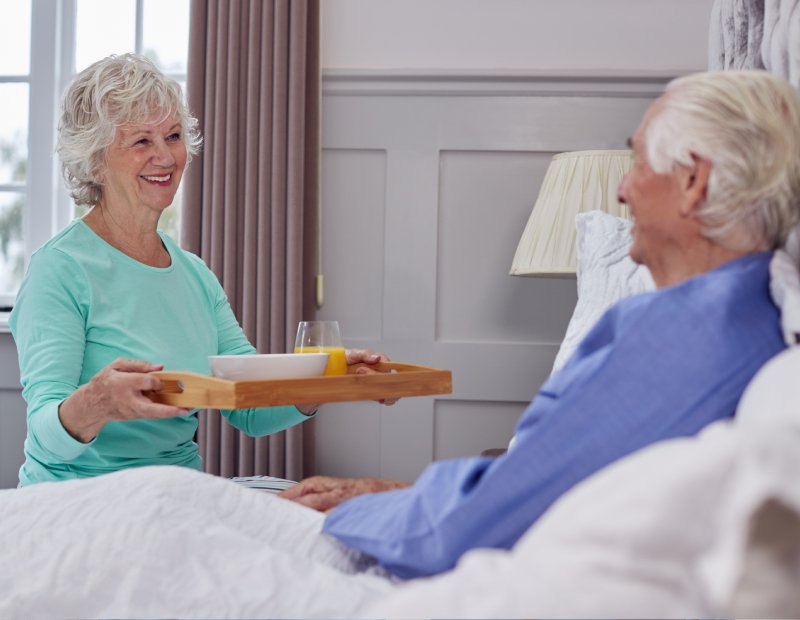Signs Your Loved One Needs Care
Recognizing the signs that your loved one might need professional home care is crucial to ensure their well-being and safety. Let’s explore the key indicators of physical and cognitive decline.
Physical Decline Signs
Monitoring physical health is essential to determine when professional home care may be required. Key indicators to watch for include:
| Sign | Description |
|---|---|
| Decline in Health | Noticeable weight loss, weakened muscles, frequent illnesses, or a lack of energy. |
| Mobility Issues | Problems with walking, difficulty getting up from a seated position, or frequent falls. |
| Personal Hygiene | Noticeable neglect of personal grooming such as unkempt hair, body odor, or dirty clothes. |
| Household Management | Difficulty maintaining a clean and organized home, problems with meal preparation, or neglecting household chores. |
| Medication Management | Missing doses, mixing up medications, or struggling to manage prescriptions. |
Reference: BrightStar Care
For more information on how to support older adults in activities like cleaning and meal preparation, visit our article on how meal preparation services improve seniors’ well-being.
Cognitive Decline Indicators
Cognitive decline can affect various aspects of daily life, making professional home care a necessity. Important signs include:
| Sign | Description |
|---|---|
| Memory Loss | Increased forgetfulness, difficulty recalling events, or missing important appointments (Nurse Next Door). |
| Disorientation | Confusion about dates, times, or locations, often linked to conditions like Alzheimer’s or dementia. |
| Difficulty Communicating | Challenges in expressing thoughts, following conversations, or understanding written and spoken language. |
| Behavioral Changes | Sudden mood swings, irritability, or signs of Sundowner’s Syndrome, where disorientation and confusion worsen in the evening (Nurse Next Door). |
| Daily Living Struggles | Difficulty with basic tasks such as bathing, dressing, or cooking, which are crucial for independence. |
For a detailed discussion on activities of daily living (ADLs) and how they contribute to senior independence, check out how activities of daily living (ADLs) keep seniors independent.
Recognizing these physical and cognitive decline signs can help in making informed decisions about initiating professional home care. For additional guidance on navigating this transition, visit our page on reducing hospital readmissions with post-hospital care services.
For those specifically interested in care options for veterans, our guide on how to access veterans home care benefits in sacramento provides valuable insights and support.
Initiate the Conversation
Discussing the need for professional home care can be challenging. Here, we outline how to effectively communicate the benefits of home care and establish strong caregiving relationships.
Focus on Home Care Benefits
When talking with loved ones about the possibility of professional home care, it’s crucial to emphasize the benefits rather than any limitations. Highlight the positives, such as increased safety, companionship, and assistance with daily activities. Point out how professional caregivers can help with tasks like meal preparation, light housekeeping, and instrumental activities of daily living (IADLs), ensuring your loved one maintains a higher quality of life.
Inform your loved one that professional caregivers are trained to support veterans and seniors in the comfort of their home. This approach nurtures independence and emotional comfort, which is particularly valued among seniors.
| Benefit | Details |
|---|---|
| Increased Safety | Minimized fall risks, medication reminders, and emergency support. |
| Companionship | Emotional and social interaction to reduce loneliness. |
| Assistance with IADLs | Support with transportation, shopping, and household chores. |
| Expert Care | Expertise in handling age-related conditions and providing specialized care. |
Building Caregiving Relationships
Effective communication and relationship-building are key when considering home care for a loved one. Initiate the conversation early, before the need becomes urgent, to allow for a relaxed and non-emotional discussion. Involving family members in the conversation can help your loved one understand how their growing needs affect those around them and emphasize the communal desire to keep them safe and comfortable.
Consistency is paramount in these discussions. If initial conversations don’t go as planned, remain calm and persistent. Continuously listen to your loved one’s concerns and involve other family members for a supportive dialogue. Including a representative from a local home care agency like Bravo Personal Care in Gold River, CA, can also provide your loved one with insightful information about services and support.
For more detailed information on the various aspects of non-medical in-home care, explore our comprehensive guide to non-medical home care in Sacramento.
By focusing on the advantages of in-home care and fostering strong caregiving relationships, you help ensure that the transition to home care is smooth and well-received.
Considerations for Home Care
When it comes to choosing professional home care for your loved one, it’s essential to understand the different options available. At Bravo Personal Care in Gold River, CA, we provide full-service non-medical in-home care to Veterans. Here, we will explore two primary considerations: hourly versus 24-hour care and the importance of discussing backup care.
Hourly vs. 24-Hour Care
Choosing between hourly and 24-hour care depends on your loved one’s specific needs and circumstances. Here are the key differences:
| Type of Care | Description | Suitable For |
|---|---|---|
| Hourly Care | Caregivers provide support during specified hours, typically ranging from a few hours a day to multiple days a week. | Individuals who need assistance with activities of daily living (ADLs) but do not require constant supervision. |
| 24-Hour Care | Caregivers are available around the clock, ensuring continuous support and supervision. | Individuals with significant health issues, including cognitive decline or mobility challenges, who require continuous care. |
Hourly care can include help with tasks such as light housekeeping, meal preparation, and companionship, which can significantly enhance the quality of life for seniors. For more in-depth information on ADLs, see our article on activities of daily living (ADLs).
24-hour care ensures that seniors receive continuous monitoring, which is particularly beneficial for those who require constant attention due to cognitive or physical limitations. To learn more about the benefits of continuous care, check out our piece on the role of hospice care support in enhancing end-of-life comfort.
Discussing Backup Care
Planning for backup care is critical when considering home care services. Unexpected situations can arise, and having a backup plan ensures that your loved one’s needs are always met. Backup care can mitigate disruptions in care due to caregiver illness, emergencies, or scheduling conflicts.
When discussing backup care, consider these key points:
- Availability of Backup Caregivers: Ensure that the home care agency has a reliable pool of trained caregivers available for emergencies.
- Consistency of Care: Seek agencies that prioritize continuity by providing caregivers familiar with your loved one’s needs and preferences.
- Clear Communication: Establish a communication plan for notifying family members and coordinating backup care Choose Comfort Home C.
To understand how Bravo Personal Care Services ensures quality care and manages backup care, visit our page on how Bravo Personal Care Services ensures quality care for seniors.
Considering the right type of care and having a robust backup plan in place are essential steps in ensuring the well-being and safety of your loved one. For more detailed discussions on costs and affordability of home care, refer to our comprehensive guide to non-medical home care.
Understanding Home Care Options
When it comes to selecting professional home care services for a loved one, especially a veteran, it’s important to understand the various options available. Tailored in-home services and understanding costs and affordability can make a significant difference in ensuring quality care.
Tailored In-Home Services
In-home care services are customized to meet the specific needs of each individual, addressing medical conditions, mobility limitations, and personal preferences. This personalized approach promotes overall well-being and quality of life.
Types of In-Home Services:
- Personal Care: Assistance with activities like bathing, dressing, and grooming.
- Companionship: Providing social interaction and emotional support.
- Meal Preparation: Ensuring nutritional needs are met with balanced meals.
- Light Housekeeping: Help with chores like cleaning, laundry, and organizing (how light housekeeping helps seniors live independently).
- Medication Reminders: Ensuring that prescriptions are taken correctly and on time.
- Transportation: Helping with errands, doctor’s visits, and social activities.
- Respite Care: Temporary relief for family caregivers.
These services encourage independence by providing support for daily activities without taking away the sense of autonomy, allowing seniors to maintain their dignity and decision-making abilities (Focus Family Care).
Costs and Affordability
Understanding the costs associated with home care is essential for planning and making informed decisions. The cost of non-medical home care can vary widely depending on the level and type of care required.
Please note that these are approximate costs and can vary based on location and the specific needs of the care recipient (understanding the cost of non-medical home care in sacramento).
Options for Financial Assistance:
- Veterans Benefits: Many veterans may qualify for assistance through programs like the Veterans Aid & Attendance Program.
- Long-Term Care Insurance: Policies that can cover some or all the costs of in-home care.
- Medicaid and Medicare: May cover certain services for eligible individuals.
By exploring different home care options, including financial assistance programs, families can find affordable solutions tailored to their needs. For more information on veterans home care benefits, read our guide on how to access veterans home care benefits in sacramento.
Selecting the right in-home care services ensures that your loved one can enjoy the emotional comfort of staying in their own home while maintaining independence and dignity with professional support from providers like Bravo Personal Care.
Benefits of Professional Home Care
Exploring the benefits of professional home care can help us understand why many families in Gold River, CA, choose Bravo Personal Care for their loved ones, especially Veterans. Let’s discuss two significant benefits: emotional comfort and maintaining independence.
Emotional Comfort at Home
Staying in a familiar environment can greatly contribute to a senior’s emotional well-being. Seniors who receive in-home care services remain surrounded by cherished memories and possessions, providing a sense of comfort and security. This familiarity can alleviate feelings of anxiety and stress associated with moving to a new setting, like a nursing home.
Moreover, professional in-home care providers, such as Bravo Personal Care, ensure that seniors receive personalized, one-on-one care. This individual attention enhances their quality of life and reduces the frequency of doctor visits by up to 50% annually. By staying home, seniors also enjoy better privacy and do not have to “wait for their turn” when care is needed.
For more insights on how home care can benefit Veterans, visit our article on A Guide to Veteran-Focused Senior Care in Sacramento.
Maintaining Independence
In-home care services encourage independence by providing necessary support for daily activities without taking away seniors’ sense of autonomy. This support allows older adults to continue making their own decisions, thereby maintaining their dignity. One-on-one care also assures more private, individualized attention.
Whether it’s assistance with Activities of Daily Living (ADLs) like bathing and dressing or Instrumental Activities of Daily Living (IADLs) like meal preparation and transportation, in-home care services ensure that seniors can live more independently. Transportation services further facilitate mobility, allowing seniors to attend appointments, social activities, or run errands conveniently.
To delve deeper into the ways professional home care promotes independence, read our article on How Non-Medical Home Care Promotes Senior Independence.
Overall, the benefits of professional in-home care are numerous. By keeping your loved one in the familiar and comforting environment of their own home, and by providing tailored support that fosters independence, Bravo Personal Care ensures the well-being of Veterans and seniors in Gold River, CA. For more information on in-home care costs, visit Understanding the Cost of Non-Medical Home Care in Sacramento.
Transitioning to Home Care
Transitioning a loved one to professional home care can be challenging for families. Understanding the proper guidance and regulatory standards helps ensure a seamless shift and quality care. Here’s what you need to know.
Guidance for Family Caregivers
Family caregivers play an essential role in providing care with a personal touch and emotional connection. However, caregivers may face burnout and lack formal training. To ease this process, the following steps can guide the transition:
- Recognize the Signs: Look for indications that your loved one struggles with daily activities such as cleaning, meal preparation, or personal hygiene. Visit our thorough guide on recognizing signs your loved one might need professional home care.
- Communicate Openly: Discuss the benefits of home care, like emotional comfort and maintaining independence.
- Professional Expertise: Professional caregivers bring rigorously trained expertise to address a broad spectrum of needs. Learn more about how Bravo Personal Care Services ensures quality care for seniors.
Importance of Regulatory Standards
Professional home care agencies, including Bravo Personal Care in Gold River, CA, operate under strict regulatory standards. This regulatory framework provides families with peace of mind, knowing their loved ones receive top-quality care.
Key Regulatory Standards:
| Standard | Description |
|---|---|
| Certification Requirements | Professional caregivers undergo rigorous training and certification to ensure they are well-equipped for comprehensive care. |
| Nationally Recognized Standards | Agencies meet high-level care standards to ensure quality and safety. See how Bravo Personal Care helps seniors stay safe at home. |
| Regular Assessments and Reviews | To maintain certification, agencies must regularly undergo assessments, ensuring ongoing compliance and continual improvement. |
Explore more on how these standards impact the quality of life and safety through non-medical home care.
For those considering professional home care, it’s crucial to align expectations with regulatory standards, ensuring the care provided is both safe and effective. Regulatory standards offer a framework that supports high-quality care essential for fostering trust and security within the family unit. Learn about transitioning smoothly with our guide on post-hospitalization care.




